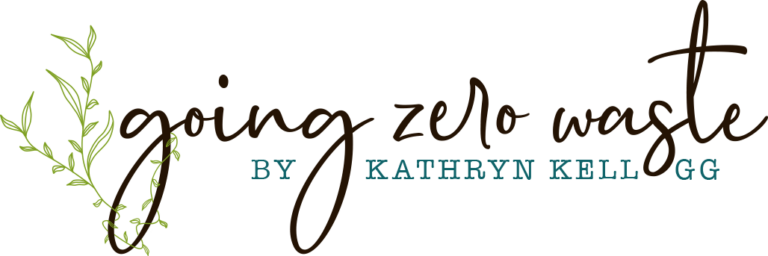About Zero Waste
what is zero waste?
The simple answer: We aim to send nothing to a landfill. We reduce what we need, reuse as much as we can, send little to be recycled, and compost what we cannot.
The less simple answer: It’s really about redefining the system. We currently live in a linear economy where we take resources from the earth and then dump them in a giant hole in the ground. The goal of zero waste is to move to a circular economy where we write trash out of existence. The circular economy mimics nature in that there is no trash in nature.
Instead of discarding resources, we create a system where all resources can be resumed fully back into the system.
Check out this blog post for a detailed look at the definition of zero waste and the circular economy.
what’s wrong with landfills?
The average american sends 4.4lbs of trash to the landfill every day. We live in a disposable society where we don’t value our belongings, and we’re consuming way too many resources.
Each year we have Earth Overshoot Day to mark when we’ve consumed all of the resources the earth can sustainably produce for the coming year. Earth Overshoot day was August 2nd of 2017. We’re essentially consuming 1.5 earths.
Beyond our overconsumption problem, landfills are toxic. They’re responsible for 20% of the methane emissions in the US, and they aren’t aerated for proper decomposition of natural materials. Toxins from cleaners, batteries, small electronics (and other items that shouldn’t be landfilled) leach into the soil and can run off into the ocean and ground water when it rains.
A lot of trash doesn’t even make it to the landfill. Instead it clutters the sides of roads and swirls in the ocean. Plastic is especially dangerous to the ocean, marine life, and our health. It doesn’t biodegrade it photodegrades which means it only gets smaller and smaller.
Each micro-plankton in the ocean has 36 micro-plastic pieces to match. Plastic breaks down so small that it’s in drinking 90% of drinking water both bottled and tap world wide.
can’t we recycle our way out of this?
Unfortunately, no.
There’s simply too much to process, and we’re just consuming way too much. Recycling isn’t a perfect solution. While it plays into the solution, we have to lessen our dependence. Did you know, only 9% of plastic is actually recycled?
There’s a reason recycle is LAST. “Reduce, Reuse, Recycle”
Recycle shouldn’t be the first line of defense, it should be a last resort. Most of our recycling isn’t even processed in the US. It’s processed in China, and China has put a ban on paper and plastic bales over 1% contamination. To put this in perspective, the best recycling facilities in the US are currently operating at 4% contamination level.
I’m not telling you this to prevent you from recycling. I’m telling you this so you can recycle better and depend on it less. You can read more about recycle rates here. Instead focus your efforts on reducing and reusing.
what’s reducing and reusing?
You don’t need everything you think you “need.” So many products are sold to us for a specific use. But, you don’t need a separate cleaner for the floor, the windows, and the bathroom. You don’t need eight blue sweaters. By reducing what we need, we’re reducing what we’ll eventually throw out.
Before making any purchase, wait. Spend some time, think about whether or not you truly need it.
When you do need to buy something, check the second hand market first. Reuse something that already exists, and instead of using disposables focus on reusables (i.e. hankies instead of tissues.) which will intern also reduce what you need. Check out my top 10 zero waste swaps for ditching disposables.
will one person really make a difference?
YES! Every day you have the decision to positively impact the planet. How do you get to work? How do you buy your groceries? What are you eating? What are you buying? Everything is interconnected. Every purchase you make is a vote for the kind of world you want to live in.
You don’t vote only at the ballot box. You vote every day.
With just one small step at a time, you can greatly reduce your footprint. But, going zero waste isn’t just great for the environment, you’ll notice an improvement in your quality of life. Side effects include eating better, feeling better, saving money, and not having to take out the trash!
can you help me?
Of course! Going zero waste has been such a liberating process for me, and I want to share everything I’ve learned with you.
Going Zero Waste is dedicated to bringing you tested and tried zero waste recipes to help you clean your house, shake up your beauty routine, or get dinner on the table quickly. You will find practical tips that break zero waste living down into an easy step-by-step process. Most importantly, you will find a place of community and support wether you’ve just started going zero waste or you’re trash in a mason jar level.
With just one step in the right direction, you can change the world.
Check out The Zero Waste Challenge!
how long will this take?
We live in a society of instant gratification. Going zero waste is not conducive to that attitude. It takes time and patience. I tend to beat myself up for not being perfect, but in the beginning you’re not going to be perfect. It’s about the effort. It’s knowing that you want to change; It’s knowing you’re trying.
And, seriously – thank you for trying! Together we can make a difference, and maybe in our lifetime we can see the Great Pacific Garbage Patch disappear, significantly reduce the amount of waste going into landfills, and become healthier and more fulfilled as people.
We can do this together. Join my zero waste community to connect with like minded individuals who will support you on your zero waste journey – plus you get my eBook, a zero waste starter workbook, and tips straight to your inbox!
“Unless someone like you cares a whole awful lot,
Nothing is going to get better. It’s not.”
— Dr. Seuss, The Lorax

